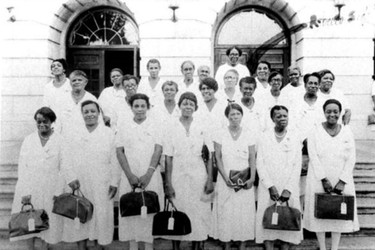The Importance of Black Midwives & Doulas
Posted by Wombilee on Mar 5th 2023

In a world where a Black woman's needs are overlooked, misunderstood, or undermined, there is the need and desire to take matters into our own hands. No one understands the Black woman better than she–the Black woman herself.
Black midwives and doulas are offering services on a scale that surpasses the standard of the typical medical industry. They consider the Black woman's circumstances to help them accordingly. From lack of resources or funds to life-threatening information, Black midwives and doulas are on a mission to assist Black women and their families in changing the statistics of success in childbirth.
There is an aura of fear, distrust, or simply a disconnection that arises for many women of color who put their well-being in the hands of the commercial medical industry. It's common for her to avoid it altogether and deal with their matters independently until absolutely necessary. This could potentially lead to complications or high-risk scenarios. Black midwives and doulas can sympathize and empathize with these women of color and support them emotionally while educating them on what's most important to them and their baby's health.
What may seem like cases of paranoia for others is a genuine concern for Black women. Too many cases prove Black women are more likely to have life-threatening experiences without the proper care to accommodate them. Who would want to walk into the unknown with statistics that prove you may not walk back out? Having a midwife and/or doula who understands the processes, the industry, and your best interest is precisely what Black expecting mothers need to feel safe. No matter what type of birth they experience, they deserve to feel secure and empowered during such a divine moment in life.
The Black Maternal Health Crisis
There has been a very obvious lack of support and recognition for black women's health across the U.S. for too long. As it states on CDC.gov, Black women are three times more likely to die from a pregnancy-related cause than white women. Multiple factors contribute to these disparities, such as variations in quality healthcare, underlying chronic conditions, structural racism, and implicit bias.
Low-quality healthcare
Hospitals that serve predominantly Black communities have higher rates of complications than other hospitals. Most cases are preventable, but urgent maternal warning signs are not being recognized, nor is providing timely treatment and quality care that can prevent many pregnancy-related deaths. A report by the U.S. Health and Human Services collected data that found most Black women are more likely to be uninsured and lack access to reproductive health care, which helps women plan their families and improve health outcomes for themselves and their children. Let's not forget that systematic barriers such as sexism and racism contribute to income inequality and financial burdens. This leads to Black women and their families having to choose between essential resources like housing, child care, food, and health care.
Chronic conditions
With a lack of medical attention, people of color are more prone to be affected by certain illnesses or deficiencies. As for Black maternal health, women are three times more likely to experience fibroids (benign tumors that grow in the uterus and can cause postpartum hemorrhaging).
Black women also display signs of preeclampsia earlier in pregnancy. This condition, which involves high blood pressure during pregnancy, can lead to severe complications, including death if improperly treated.
Structural racism
Black history has shown why there's a constant fear of the medical institution regarding safety and discrimination. Excluded from any and all humane services, enslaved Black people were used in many medical experiments that have shaped American medicine that continues to affect how patients are treated today.
After 1808, when a federal ban on importing enslaved people from other countries went into effect, the continuation of American slavery became dependent on domestic slave births. That aligned the economic interests of slave owners who wanted to promote the healthy births of slave children and the interests of white physicians who portrayed themselves as helping enslaved people but also gained professional benefits because they could experiment on the enslaved without their consent.
Racist beliefs associated with slavery gave ethical justifications that Black women had stronger pain tolerances, less sensitive nervous systems, and could endure much more than white women. This led to doctors performing gynecological surgeries and other procedures with no pain medications such as anesthesia. These racist beliefs have extended beyond the institution of slavery, evolved, and continue to be a standard perception that puts black lives in danger.
The Roots of Black Birth Care
Black birth care has been the heritage of Black women and families for centuries. It can be traced as far back as 1800 BCE in texts regarding gynecological procedures & concepts in Africa. Black women were always essential to birth care and midwifery, as opposed to men who also practiced medics. Tradition has a way of persevering when it evolves into a standard of success and accomplishment. These traditions would be taught and, for others, coached through experience and found to be an established practice.
Before the 1930s, in the U.S., Black women solely entrusted other Black women to care for their vital needs during pregnancy, birth, and postpartum. These women could be family, a friend, doulas, and/or midwives–and were responsible for preparing the necessary tools and supplies for childbirth. As the midwife administered medicine and ensured general hygiene, the doula or female attendant would provide mental, emotional, and physical support.
Experienced midwives were among the many enslaved individuals who were able to practice and train others throughout the country. These birth workers played a significant role in Black American communities, serving as healers or spiritual leaders. They were well respected and considered medical practitioners with high intelligence–slave owners used them to ensure the health of their reproducing enslaved women and their newborn infants to expand their labor force. It was also common for Black midwives to be entrusted to care for the slave master's wives during birth.
After emancipation, Black-American midwives continued to work with both Black and white women in rural and remote parts of the South. Hospitals were rarely accessible, and there were few willing or trained doctors available to serve these populations, making midwives the only feasible option for expectant mothers.
However, the medical industry evolved during the latter half of the twentieth century. This left the role of the midwife to change as the practice of delivering babies became a medical specialty–minimizing a tradition that has kept Black mothers feeling secure and Black birth workers feeling significant.
Modern Black Midwives & Doulas Changing and Saving Lives for Future Generations
After a devastating period of enslavement and segregation, the minds of Black Americans have been altered psychologically, which has been instilled in families for generations. Even during these modern times, structural racism has steered Black families to experience a particular American lifestyle that contributes to poor mental health.
Poor living conditions, medical care, and education systems are huge factors in why Black people are systematically structured to fail or work very hard not to.
Modern Black midwives & doulas are coming to the rescue to ensure the structure of Black families is changing, starting in the womb. According to our history, birth workers catered to Black women during harsh social conditions that were more of an obligation to one another rather than genuine health morality. No one else would help these Black expecting mothers, and there was nowhere else for them to go.
Today, with multiple options to choose how to handle one's pregnancy, Black women can consciously embrace the nurturing and wholly beneficial experience that she deserves.
Black children will have a better chance of thriving physically and mentally, being birthed by a mother who has had a spiritually & mindfully uplifted pregnancy/birth experience. Black midwives & doulas are essential to future generations because these experiences multiply throughout time. The education process and mindful attention these birth workers offer are priceless and will hopefully aid in a new standard of living for Black families.

